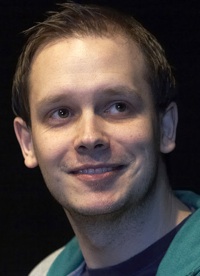
Pirate Bay spokesperson Peter Sunde Kolmisoppi took the stand today in Sweden as The Pirate Bay's trial entered its fifth day, and he made a startling claim: in his own survey, 80 percent of the torrents on the site pointed to material that was legal to share online.
In previous days, prosecutor Hakan Roswall and media industry lawyers pressed the defendants on whether they were aware that the site contained links to copyrighted material; the answer from Fredrik Neij was "yes," but only because content owners continually sent letters to The Pirate Bay asking them to remove links to certain materials.
Friday, Kolmisoppi revealed that he had looked more directly into the issue by performing a survey on 1,000 random torrents from the site. Along with some workers in chat rooms, Kolmisoppi tried to figure out how much of this material appeared to infringe copyright—though they apparently did so without downloading any of it.
The result? 70 to 80 percent of the material was deemed to be legal for sharing, and Kolmisoppi claimed that there was actually a larger proportion of infringing material on YouTube than on The Pirate Bay. (Read the excellent Twitter translation of the trial for more details from the testimony.)
The testimony fits with repeated defense claims that the site, despite its name, is really just a tool with plenty of legal uses. Infringement can be addressed by going after end-users, not the tool providers. (Attempts by the music industry to do just this across the US and Europe were not exactly embraced by the "tool makers," however.)
70 to 80 percent of the material was deemed to be legal for sharing, and Kolmisoppi claimed that there was actually a larger proportion of infringing material on YouTube than on The Pirate Bay.
Today's trial was also marked by a bizarre bit of geek speak as prosecutor Hakan Roswall (attempted to) pull out his geek card. TorrentFreak has the translation:
"When did you meet [fellow defendant Gottfrid] for the first time IRL?" asked the Prosecutor.
"We do not use the expression IRL," said Peter, "we use AFK."
"IRL?" questioned the judge.
"In Real Life," the Prosecutor explained to the judge.
"We do not use that expression," Peter noted. "Everything is in real life. We use AFK—Away From Keyboard."
"Well," said Roswall. "It seems I am a little bit out of date."
Music industry lawyer Peter Danowsky also had a chance to grill Kolmisoppi and began questioning him about various speeches and newspaper articles that had not previously been entered into evidence. Defense lawyers objected to the introduction of new evidence, and after a court recess, Danowsky had to turn over all documents he planned to use in the trial for photocopying.
Some of the questions, which involved Kolmisoppi's own views about copyright, were greeted with angry retorts about whether the trial was about alleged illegal activities or political viewpoints. Kolmisoppi followed these up with a Twitter post. "That was annoying," he wrote. "Now it's certain this #spectrial is political. Anyone hear a question that was not based on ideology?"
To shake off his annoyance, Kolmisoppi and The Pirate Bay gang are throwing a party tonight for 200 people. Not apparently worn out from his work on the stand today, Kolmisoppi will be making an appearance at 1am.
PWNING ROSWALL
While the party has nothing to do with the legal issues, it did prompt one of the administrators to write about the decentralized model of decision-making and activity that characterizes the Bay—and has proved so vexing to a prosecution intent on drawing up some kind of organized hierarchy.
In the post, one "Johan Allgoth" explained that people choose roles to fill that sound interesting: "Quite often these roles are abandoned. The network then reorganizes til someone is filling the role again, or, the role is disregarded by all nodes and that role dies out. This could happen to the party tonight, but that won't be the case. A party is ohh so nice.
"This is one of hundreds of examples of our management. It is how we have been operating since the very start. People have a hard time grasping it. They ask us; Who’s in charge? Who are you representing? What is your goal? What is your agenda? Why? When? How? These questions are wrongly posed and I am afraid I cant give you the right ones, that’s up to scholars later...
"There is no formal organisation. Only work with joy and no to full accountability. This is how we PWN U ROSWALL. The work that is being produced by the peers of the Spectrial is probably 'worth' six-seven figures. Thing is one could never buy it. It's a brave new world here, we are making a huge experiment."
While the "PWN U ROSWALL" bit is more than a little juvenile, there's something appealing about this model. "Work with joy" sounds like a pretty fair description of what people want out of their jobs, exactly the opposite of what W.H. Auden described in the lines:
As an unimportant clerk
Writes I DO NOT LIKE MY WORK
On a pink official form.
But is the work in question legal? That's what the professional judge and three lay judges overseeing the trial will have to decide in the next two weeks.
reader comments
93